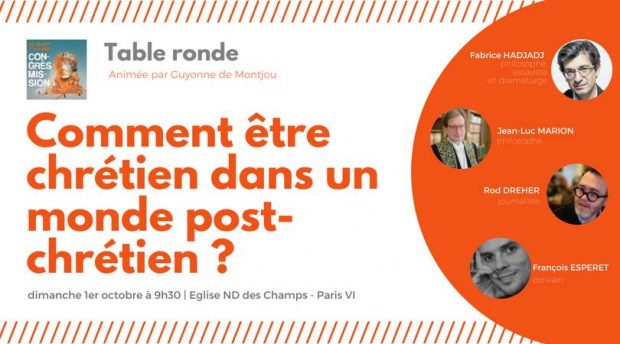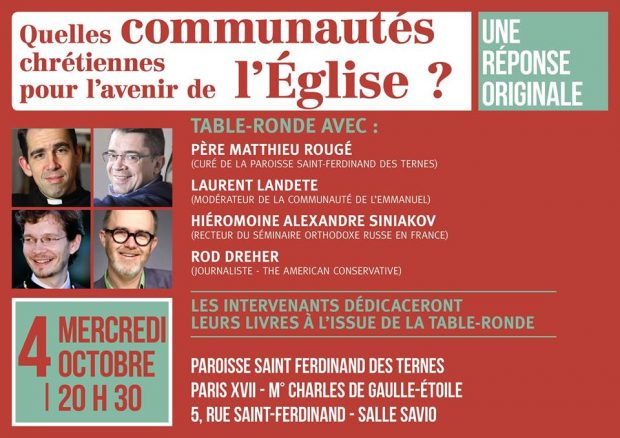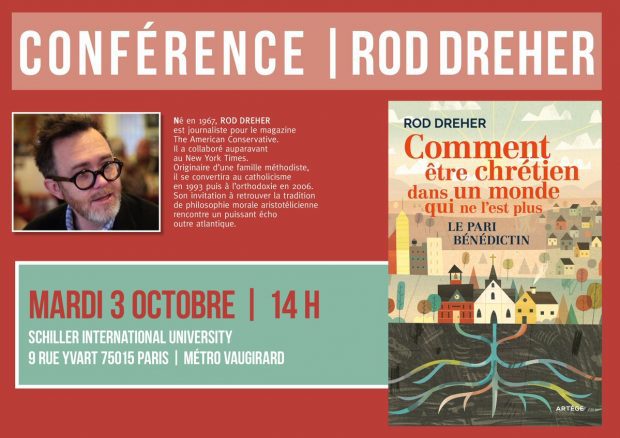For European Christian Unity

Hello everyone, from the Northwest Arkansas Airport. I’m about to start a long journey that won’t end until I’m in Paris tomorrow morning. I’ll be there promoting the French-language version of The Benedict Option. Details of my planned appearances in the city are below. If you are a Parisian reader of this blog, I hope to meet you.
The contemporary state of religious life in Russian society is directly linked to the tragic events of 100 years ago.
The historical catastrophe of 1917 embroiled Russia in a fratricidal civil war, terror, exile of the nation’s best representatives beyond the confines of their homeland, and the deliberate annihilation of whole layers of society – the nobility, the Cossacks, the clergy and affluent peasants.
They were declared to be “enemies of the people,” and their relatives were subjected to discrimination and became the “disenfranchised,” which forced them to the edge of survival.
All of this terror took place under the banner of a communist ideology that fought ferociously against religion.
Millions of believers were subjected to the cruelest of persecution, harassment, discrimination and repression – from mockery and dismissal in the workplace to imprisonment and execution by firing squad.
The Church in those years produced a great multitude of martyrs and confessors for the faith who, as St. Paul said, “were tortured, not accepting deliverance; that they might obtain a better resurrection: and others had trial of cruel mockings and scourgings, yea, moreover of bonds and imprisonment” (Heb 11.35-36).
Discussion on the future of Christianity in Europe is impossible without understanding the prospects for the survival of religiosity among its inhabitants.
Research carried out by the Center for the Study of Global Christianity at Gordon-Cornwell Theological College, USA, indicates that the number of Christians in Europe will be consistently falling: from 560 million people in 2015 to 501 million by 2050.[6]
The calculations of the Pew Research Center are more pessimistic and foretell a reduction in Christians in Europe from 553 million people in 2015 to 454 million people by 2050.[7]
These are alarming prognoses, but they reflect the current trends in the transformation of the religious picture of Europe, and they cannot be ignored.
Some are suggesting that, unless special force is applied, Europe cannot simply cease to be Christian on the grounds that Europe has for many centuries been Christian.
I would like to remind you all that in Russia before 1917 nobody ever proposed that the collapse of a centuries-old Christian empire would happen and that it would be replaced by an atheistic totalitarian regime. And even when that did happen, few believed that it was serious and for long.
The modern-day decline of Christianity in the western world may be compared to the situation in the Russian Empire before 1917.
The revolution and the dramatic events which followed it have deep spiritual, as well as social and political, reasons.
Over many years the aristocracy and intelligentsia had abandoned the faith, and were then followed by common people.
His Holiness Patriarch Kirill of Moscow and All Russia spoke of this in January 2017: “The fundamental rupture in the traditional way of life – and I am now speaking… of the spiritual and cultural self-consciousness of the people – was possible only for the reason that something very important had disappeared from peoples’ lives, in the first instance those people who belonged to the elite. In spite of an outward prosperity and appearance, the scientific and cultural achievements, less and less place was left in peoples’ lives for a living and sincere belief in God, an understanding of the exceptional importance of values belonging to a spiritual and moral tradition.”
Met. Hilarion says, “I firmly believe that a Europe which has renounced Christ will not be able to preserve its cultural and spiritual identity.” He speaks of ways in which secular authorities drive traditional Christians from the public square, under the guise of human rights. More:
In a situation where we have aggressive pressure of the groups which propagate ideas unacceptable from the perspective of traditional Christian morality, it is essential to unite the Churches’ efforts in opposing these processes, to act jointly in the media, in the sphere of legal support, as well as in propagating common Christian values at all possible levels.
It is important that the Churches share their experience in this sphere, and develop cooperation between church human rights organizations and monitoring centers.
I believe it important that Christians of Europe should stand shoulder to shoulder to defend those values upon which the life of the continent has been built for centuries, and that they should view the afflictions and dismay of Christians throughout the world as their own.
The Catholic Herald in the UK responds. Excerpts:
The Metropolitan also focuses on another factor that has led to a change in the religious landscape of Europe: large-scale immigration from outside Europe, and in particular from the Middle East and Africa. While he does not suggest that this migration should be halted or can be halted, here Metropolitan Hilarion finds himself in the opposite corner to the Pope, at least in the question of tone. For Hilarion, immigration is a challenge or even a threat, but for the Pope it is the opportunity to welcome the stranger. Indeed, more or less at the same time as Hilarion was speaking, Pope Francis was warning against the “temptation of exclusivism and cultural fortification.”
His strong words are clearly coming from a different perspective from Hilarion’s, and yet it would be a mistake to see these points of view as mutually exclusive. The truth is that Hilarion is right: if we admit large numbers of migrants from North Africa and the Middle East, then the character of Europe will change. The only question is how will it change, and whether this change will be a good or a bad thing. Again, there can be no dispute that Christians have a duty to welcome the stranger, as the Pope says, and that ethnocentrism is not the Christian way. But this does not answer the question of how we welcome the stranger, nor does it address the question whether the best way to help people and their countries is to let them enter Europe, rather than helping them at home.
That’s striking, the stark difference between the way the Pope sees the migration crisis, and the way the Russian Orthodox Church sees it. About the Metropolitan’s call for in the last few grafs I quoted above, the Catholic Herald says, piquantly:
That sort of conclusion resembles what Catholics have been saying for years, and is very welcome, though how this will work out in practice is unclear, given the fact that the Russian Church seemingly never challenges the Russian government, which is guilty of numerous human rights abuses.
Metropolitan Hilarion’s speech is certainly interesting, and in many ways challenging. On many topics, he hits the nail on the head, but in practical terms, where do we go from here? An honest discussion about Ukraine would be a good place to start.
Good point. Still, Met. Hilarion is quite right overall. I hope that in my own small way, with The Benedict Option in its various forthcoming translations into European languages (German, Czech, Slovak, Portuguese), will in some small way help to encourage and to strengthen ties between faithful small-o orthodox Christians in Europe. Again, if you are in Paris, I hope you will be able to come out to one or more of my talks in the coming days, so you can meet others interested in the Benedict Option:



And also these, in smaller venues. Copies of the book will be available for purchase:
SUNDAY OCT 1:
11h30 : Conférence de 20-30 minutes
Crypte St François
Sous l’église St Sulpice
35 rue St-Sulpice, 75006 Paris
MONDAY OCT 2:
20h00 : Conférence de 30 minutes à la Paroisse Cathédrale Saint-Irénée (orthodoxe)
96, bd Auguste Blanqui 75013 PARIS – Métro Glacière
TUESDAY OCT 3:
19h00-21h00 : Mardi de Limite
60 Rue de Rome, 75008 Paris
WEDNESDAY OCT 4:
20h30 : Soirée-débat
Paroisse St Ferdinand des Ternes
27 Rue d’Armaillé, 75017 Paris
Librairie Art Religieux – M. Bizard – 26 rue Armaille 75017 Paris


Subscribe for as little as $5/mo to start commenting on Rod’s blog.